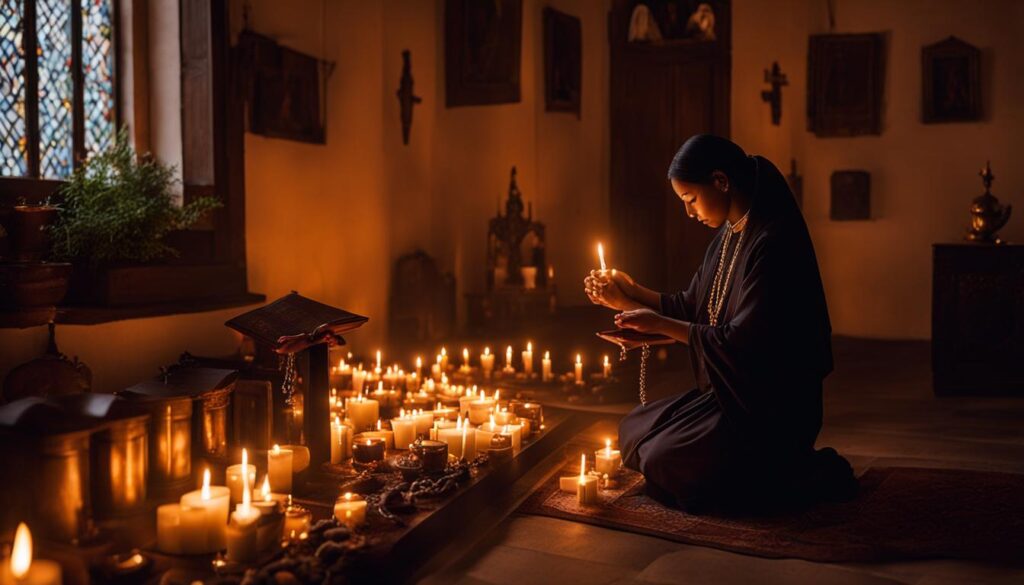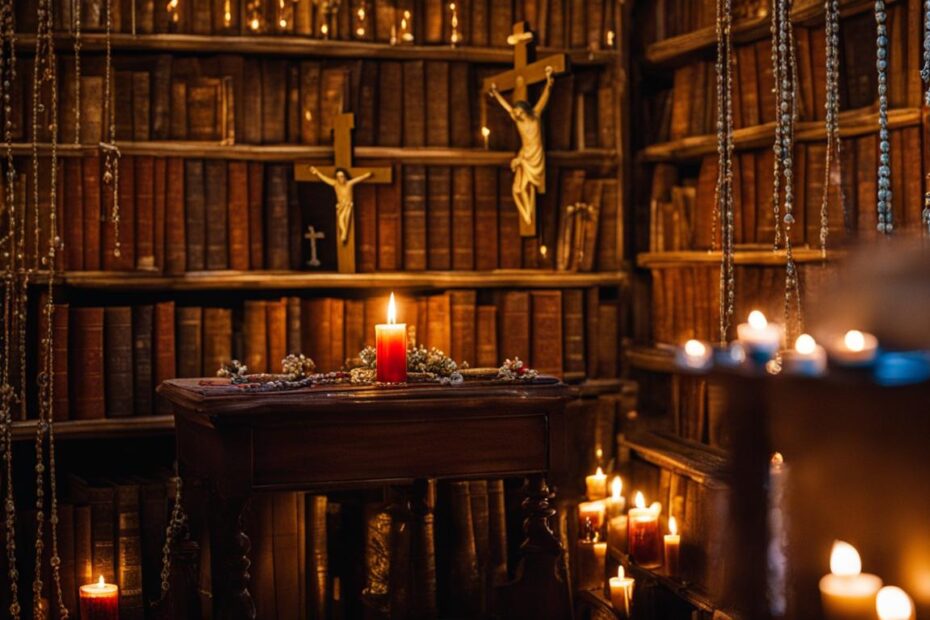Evening prayer holds a sacred place in the Catholic tradition, providing individuals with a serene and meaningful way to connect with God. It is a time to reflect on the blessings of the day, seek forgiveness, and find solace in the presence of the divine.
In this comprehensive guide, we will explore the significance of evening prayer in the traditional Catholic faith and offer guidance on how to incorporate it into your daily routine. Whether you are new to evening prayer or looking to deepen your spiritual practice, this guide will provide you with the knowledge and inspiration you need.
Key Takeaways:
- Evening prayer is a sacred tradition in the Catholic faith, allowing individuals to connect with God and find peace at the end of the day.
- It is a time to offer gratitude for blessings, seek forgiveness for sins, and find solace in the presence of God.
- Traditional Catholic evening prayer rituals follow a structured format, including prayers of thanksgiving, repentance, and protection.
- Saint Augustine and Saint Alphonsus Liguori have penned powerful evening prayers that offer solace and guidance.
- The Liturgy of the Hours, including Night Prayer, is an important part of evening prayer in the Catholic Church.
The Importance of Evening Prayer in the Catholic Faith
Evening prayer holds immense importance in the Catholic faith as it allows individuals to reflect on their day, offer praise and thanks to God, and seek forgiveness for any wrongdoings. It is a time to deepen one’s relationship with God and find solace in His guidance. By engaging in evening prayer, Catholics can strengthen their faith and find peace amidst the challenges of everyday life.
During evening prayer, Catholics have the opportunity to pause and acknowledge the blessings received throughout the day. It is a time to express gratitude for God’s love and provision. By offering thanks during this sacred time, individuals can cultivate a spirit of gratitude, recognizing the goodness in their lives and the world around them.
Another significant aspect of evening prayer is the opportunity to seek forgiveness for any sins or shortcomings. Catholics believe that through confession and repentance, they can be cleansed of their transgressions and draw closer to God. Evening prayer provides a dedicated time to reflect on one’s actions, seek forgiveness, and commit to living a more virtuous life moving forward.
Furthermore, evening prayer offers a chance to find solace and seek guidance from God. It is a time to lay down the burdens and challenges of the day, surrendering them to the Divine. By turning to God in prayer, individuals can find comfort, strength, and clarity in His presence. It is a time to find peace and reassurance, trusting in God’s plan for their lives.
The Benefits of Evening Prayer in the Catholic Faith
Engaging in evening prayer has numerous benefits for individuals of the Catholic faith. It provides a dedicated time to deepen one’s relationship with God, offering opportunities for gratitude, forgiveness, and seeking guidance. By incorporating evening prayer into their daily routine, Catholics can experience a sense of peace, renew their faith, and strengthen their spiritual connection.
| Benefits of Evening Prayer | Explanation |
|---|---|
| Connection with God | Evening prayer allows individuals to establish a stronger connection with God, fostering a deeper understanding of His presence in their lives. |
| Gratitude and Thankfulness | Through evening prayer, Catholics cultivate a spirit of gratitude and thankfulness by acknowledging and appreciating God’s blessings and provision. |
| Forgiveness and Repentance | Evening prayer provides a time for Catholics to seek forgiveness for their sins, repent, and commit to living a more virtuous life. |
| Peace and Solace | Engaging in evening prayer brings a sense of peace and solace, offering comfort and reassurance in God’s presence. |
| Spiritual Growth | By incorporating evening prayer into their daily routine, Catholics can experience spiritual growth and a deepening of their faith. |
By recognizing the importance of evening prayer and actively incorporating it into their lives, Catholics can reap these benefits and experience a greater sense of peace, gratitude, and spiritual connection with God.
Traditional Catholic Evening Prayer Rituals
Traditional Catholic evening prayer rituals hold a significant place in the practice of the Catholic faith. These rituals follow a structured format that includes prayers of thanksgiving, repentance, and protection. By engaging in these rituals, individuals can deepen their connection with God and find solace in His presence.
One common traditional Catholic evening prayer is the Act of Contrition, which expresses remorse for sins committed and seeks God’s forgiveness. Another essential prayer is the Glory Be, offering praise and honor to the Holy Trinity. The Magnificat, a prayer of Mary’s gratitude and humility, is also often recited during evening prayer.
In addition to individual prayers, the Catholic Church offers specific evening prayer services known as Vespers. These services are often held in community settings, such as churches or monasteries, and provide a collective opportunity for Catholics to come together in worship and reflection. Participating in Vespers can enhance the sense of community and deepen one’s spiritual connection.
| Common Traditional Catholic Evening Prayers | Description |
|---|---|
| Act of Contrition | A prayer expressing remorse for sins and seeking forgiveness from God. |
| Glory Be | A prayer praising and honoring the Holy Trinity. |
| Magnificat | A prayer of gratitude and humility, often attributed to Mary. |
Establishing a routine for evening prayer at a specific time can also help create a sense of consistency and discipline in one’s spiritual practice. By setting aside dedicated time every evening for prayer, individuals can develop a habit of seeking God’s presence and finding peace in His guidance.

Evening prayer is a sacred tradition that allows Catholics to connect with God and find peace at the end of the day.
Evening Prayers from Saint Augustine and Saint Alphonsus
Saint Augustine and Saint Alphonsus Liguori, two revered figures in Catholic history, have penned powerful evening prayers that offer solace and guidance to believers. Their profound words have resonated with countless individuals seeking spiritual connection and peace at the end of each day. These prayers, rooted in the wisdom of these saints, can be incorporated into evening prayer rituals, allowing Catholics to draw closer to God and find solace in His presence.
“Lord, let your mercy be on us, as we place our trust in you. This is the prayer of St. Augustine, reminding us of God’s boundless love and mercy. It serves as a reminder that no matter our struggles or mistakes, God’s forgiveness is always available to us. By reciting this prayer, we acknowledge our need for His guidance and seek His compassion and mercy.”
“O my God, help me to remember that time is short, eternity is long. What good is all the greatness of this world at the hour of death? To love You, my God, and save my soul is the one thing necessary. Without You, there is no peace, no joy. My God, I need fear nothing but sin. For to lose You, my God, is to lose all.”
These evening prayers by St. Augustine and St. Alphonsus Liguori are not just mere words but profound expressions of faith and devotion. By incorporating these prayers into one’s evening prayer rituals, Catholics can find solace, seek forgiveness, and deepen their relationship with God.
| Evening Prayer by St. Augustine | Evening Prayer by St. Alphonsus Liguori |
|---|---|
| “Lord, let your mercy be on us, as we place our trust in you.” | “O my God, help me to remember that time is short, eternity is long. What good is all the greatness of this world at the hour of death? To love You, my God, and save my soul is the one thing necessary. Without You, there is no peace, no joy. My God, I need fear nothing but sin. For to lose You, my God, is to lose all.” |
| This prayer reminds us of God’s boundless love and mercy, inviting us to trust in Him. | This prayer urges us to prioritize our relationship with God, recognizing that true fulfillment lies in His love and salvation. |
| By reciting this prayer, we acknowledge our need for His guidance and seek His compassion and forgiveness. | It serves as a powerful reminder that worldly achievements pale in comparison to the importance of loving and serving God. |
| Through this prayer, we open our hearts to God’s mercy and reaffirm our trust in Him. | With this prayer, we humbly surrender to God’s will, seeking His presence and grace in our lives. |
These evening prayers by St. Augustine and St. Alphonsus Liguori serve as profound reminders of God’s love, mercy, and the importance of cultivating a deep relationship with Him. By incorporating these prayers into our evening prayer rituals, we can find solace, seek forgiveness, and draw closer to the divine presence. Let the words of these saints guide and inspire us as we offer our prayers of gratitude, repentance, and supplication at the end of each day.
Liturgy of the Hours: Night Prayer
The Liturgy of the Hours, also known as the Divine Office or the Breviary, is an integral part of the Catholic tradition. It is a structured form of prayer that follows the rhythm of each day, offering specific prayers and readings at different times. Night Prayer, also known as Compline, is the final prayer of the day and is typically recited before going to sleep. It is a time to reflect on the day, seek God’s protection during the night, and rest in His presence.
During Night Prayer, several psalms are recited, along with a reading from Scripture, a hymn, and specific prayers. The psalms chosen for this prayer highlight themes of trust, gratitude, and surrender. They serve as a reminder of God’s faithfulness and love, even in the darkness.
The structure of Night Prayer allows individuals to enter into a peaceful state of contemplation before sleep. It serves as a moment of surrender, letting go of the worries and burdens of the day and placing them in God’s hands. By engaging in Night Prayer, Catholics can find solace and comfort, knowing that they are protected and guided by their Heavenly Father.
Table: Components of Night Prayer
| Component | Description |
|---|---|
| Opening Verse | The prayer that initiates Night Prayer, setting the tone for the entire service. |
| Examination of Conscience | A time of reflection and examination of one’s thoughts, words, and actions throughout the day. |
| Psalmody | The recitation of several psalms, carefully chosen for their relevance to the night prayer. |
| Scripture Reading | A reading from the Bible, often centered around themes of trust, surrender, and rest. |
| Responsory | A short verse or response that follows the Scripture reading. |
| Gospel Canticle | A canticle from the New Testament, such as the Magnificat or Nunc Dimittis. |
| Intercessions | Prayers of intercession for the Church, the world, and personal intentions. |
| Concluding Prayer | A final prayer that closes the Night Prayer, expressing gratitude and trust in God’s providence. |
“Night Prayer is a beautiful way to surrender the cares of the day to God and find peace in His presence. It allows us to acknowledge our dependence on Him and to rest in His love. Through the recitation of psalms, readings from Scripture, and prayers of intercession, Night Prayer invites us to let go of our worries and anxieties and trust in God’s care for us.”
Engaging in Night Prayer as part of the Liturgy of the Hours can provide a sense of continuity and connection with the universal Church. Catholics around the world are united in praying these same prayers, offering a collective voice of praise and thanksgiving to God. By participating in Night Prayer, individuals can deepen their spiritual connection and find comfort in the knowledge that they are part of a larger, global community of believers.
How to Pray Night Prayer: A Step-by-Step Guide
Praying Night Prayer, whether as part of the Liturgy of the Hours or as an individual practice, is a beautiful way to connect with God and find peace before sleep. While it may seem overwhelming at first, following a step-by-step guide can help make the process more accessible and meaningful.
Step 1: Set a Sacred Space
Create a quiet and peaceful atmosphere by finding a designated space for prayer. It could be a corner of your room, a comfortable chair, or a peaceful outdoor spot. Set up a small altar or space dedicated to prayer with a candle, a crucifix, and any other religious items that hold significance for you.
Step 2: Enter into Silence
Take a few moments to calm your mind and enter into a state of silence. Close your eyes, take deep breaths, and let go of any distractions or worries. This is a time to center yourself and prepare to encounter God in prayer.
Step 3: Engage in the Prayers
Begin Night Prayer by reciting an opening prayer, such as the Sign of the Cross, to symbolize your entry into prayer. Then, follow the structure of the Liturgy of the Hours or choose prayers that resonate with you. This may include psalms, Scripture readings, and specific prayers for the evening. Consider using a prayer book or online resource to guide you through the prayers.
Remember, the essence of Night Prayer is to offer praise, seek forgiveness, and find solace in the presence of God. Allow the words to guide your heart and mind, offering them as a sign of your love and devotion to God.
| Step | Description |
|---|---|
| Step 1 | Set a Sacred Space |
| Step 2 | Enter into Silence |
| Step 3 | Engage in the Prayers |
By following this step-by-step guide, you can create a meaningful and transformative evening prayer experience. As you make Night Prayer a regular part of your spiritual practice, you will deepen your relationship with God and find solace in His presence before sleep.
Conclusion
Evening prayer holds a special place in the hearts of traditional Catholics, providing a serene and meaningful way to connect with God at the end of each day. By embracing this sacred practice, individuals can find solace, guidance, and renewal in the presence of the Divine.
Through evening prayer, Catholics can offer their gratitude for the blessings received, seek forgiveness for their shortcomings, and find peace in God’s unwavering love and support. This cherished tradition allows individuals to deepen their relationship with God and nurture their faith.
Whether following the structured rituals of traditional Catholic evening prayer or engaging in the beautiful Liturgy of the Hours, the practice of evening prayer holds the power to transform lives. It serves as a pillar of strength, bringing comfort and spiritual growth to individuals of all walks of life.
Incorporating evening prayer into one’s daily routine offers a sanctuary of peace where the worries and burdens of the day can be surrendered to God, and the soul can find rest and restoration. In the embrace of evening prayer, one can experience the true essence of traditional Catholic spirituality.
FAQ
What is evening prayer in the Catholic tradition?
Evening prayer is a sacred tradition in the Catholic faith that allows individuals to connect with God and find peace at the end of the day.
Why is evening prayer important in the Catholic faith?
Evening prayer holds immense importance in the Catholic faith as it allows individuals to reflect on their day, offer praise and thanks to God, and seek forgiveness for any wrongdoings.
What are traditional Catholic evening prayer rituals?
Traditional Catholic evening prayer rituals follow a structured format, including prayers of thanksgiving, repentance, and protection.
Are there specific prayers for evening prayer?
Yes, common prayers for evening prayer include the Act of Contrition, the Glory Be, and the Magnificat.
Who are Saint Augustine and Saint Alphonsus Liguori?
Saint Augustine and Saint Alphonsus Liguori are revered figures in Catholic history who have penned powerful evening prayers that offer solace and guidance.
What is the Liturgy of the Hours?
The Liturgy of the Hours, also known as the Divine Office or the Breviary, is an important part of evening prayer in the Catholic Church. It is a structured form of prayer that follows the rhythm of each day through psalms, Scripture, and prayers.
How can I pray Night Prayer?
Praying Night Prayer can be done as part of the Liturgy of the Hours or as an individual practice. It involves specific prayers, Scripture readings, and intentions.
Why should I incorporate evening prayer into my daily routine?
Incorporating evening prayer into your daily routine can help you experience peace, renew your faith, and deepen your relationship with God.








